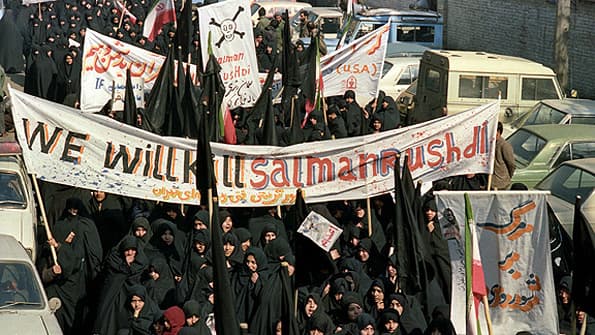“I inform the proud Muslim people of the world that the author of the Satanic Verses book… and all involved in its publication who were aware of its content, are sentenced to death…”
That’s apparently what the Ayatollah Khomeini said in 1989, while issuing the ‘fatwa’ or death sentence against the author Salman Rushdie.
Last week, more than thirty years after that original decree by the Supreme Religious Clown of Iran’s Revolution, a 24 year-old from New Jersey apparently came the closest of anyone in all those years to carrying out the hit.
Aside from being a horrific act in itself, the apparently barbaric assault on Rushdie in New York on Friday seems strangely to have been both a shock that came out of nowhere… and the fulfilment of a threat that has been public knowledge for over three decades.
The reported perpetrator of the knife attack, a 24 year-old named Hadi Matar, whose parents emigrated from Lebanon, apparently stormed the stage on which Mr Rushdie was about to speak and stabbed him multiple times.
Mr Rushdie appears to have survived the frenzy: but it is being claimed it will take a long time for him to recover from his injuries – and that he may not fully recover.
We’ll get to some of the curious details about the attack in a moment: because there *are* some curious things to take note of.
But, at the narrative level, almost as soon as the attack occurred, language was being used that was clearly meant to link the attacker to the Iranian state.
This obviously has some merit, given that Iran’s revolutionary leader was the original source of the death sentence: but some of the newspapers were very quick to suggest that connection.
As was being reported, ‘A review of Mr Matar’s social media accounts has suggested he is sympathetic to the causes of the Islamic Revolutionary Guard Corps (IRGC)…’
I haven’t been able to find any ‘social media accounts’ online connected to Hadi Matar. But we are told again elsewhere that a ‘preliminary review of the social media accounts’ suggests he sympathised with Shia extremism and the Revolutionary Guard.’
We are also told ‘a cellphone messaging app belonging to Matar included images of slain IRGC commander Qassem Soleimani and “an Iraqi extremist sympathetic to the Iranian regime”…’
Soleimani was an Iranian military officer assassinated by a US drone strike in January 2020. He was heavily involved in clandestine and overseas intelligence operations – so, if the narrative we’re being given about Hadi Matar is true, it would seem to make some sense that a man who idolises Soleimani would carry out an overseas attack on a figure famously marked for death by the Iranian regime.
Soleimani is idolised by regime-supporters in Iran as a martyr and as a great hero of the revolution. It is reported elsewhere that the Lebanese border town where Matar’s parents emigrated from is a predominately Shia village with strong sympathies for not only Hezbollah, but the Iranian regime in general and Soleimani in particular.
So the narrative kind of adds up alright here.

But it doesn’t necessarily suggest a material link between the Iranian regime and the 24 year-old: only an ideological one. However, the investigation isn’t over yet, so maybe further information will come to light to suggest a more substantial link.
And, to be truthful, the Iranian state has hardly done anything to distance itself from the brutal attack on Mr Rushdie. I don’t know how much to trust the claims in some Western media that Iranian news outlets have been praising the assault on Rushdie – though it wouldn’t be surprising if that were the case.
The state-affiliated Fars News Agency and some other news outlets had even donated money as recently as 2016 to increase the bounty on Rushdie, raising it from what was originally on offer for the author’s would-be assassin.
All of that being said, there are some things to question about this attack, however.
Two things in particular. The first is the apparent lack of security arrangements for the event Mr Rushdie was attending. Considering that Salman Rushdie is a man living under a ‘fatwa’ and with a $3m bounty on his head, it’s strange that the event organisers didn’t arrange any real security – or that Rushdie himself didn’t insist on it.
According to various reports quoting audience members, there were no metal detectors, not even any bag checks.
The explanation broadly being given for this lack of precautions is that Rushdie, after all these years, was no longer as concerned for his safety as he had been in the past. Which could certainly be true: after decades, maybe you would start to think the real danger had diminished.
Then again, Mr Rushdie knew that the death threat against him had never been retracted by the Ayatollahs – and that, as recently as 2016, Iranian agencies were openly raising the price of the bounty.
Not to mention that figures linked to Rushdie have previously come to physical harm due to this outstanding ‘fatwa’.
Some of the accounts of what transpired are even stranger.
For example, as The Guardian reported, ‘Several people in the audience for the lecture at the Chautauqua Institution… said that Matar was dressed in black and was wearing a mask, leading several to initially think his entry to the stage was a planned spectacle before the gravity of the situation became clear…’
For a man wearing a mask (and wielding a knife) to get to the event’s high-profile speaker on the stage is, at best, an indication of a woefully organised event: or, at worst, an indication that something isn’t right about the story.
But it’s the second bit that sticks out: the fact that some people thought ‘his entry to the stage was a planned spectacle‘.
I guess we should just assume that the occurrence itself was so sudden – and the moment so chaotic – that people didn’t really know what was happening: whether it was a real attack or a piece of theater.
That could very easily be what happened: and it probably is what happened. Mr Rushdie had let his guard down, the event organisers were terribly short-sighted, and a religious lunatic had chosen the right moment to try to put himself into the history books: and those three things happened to coincide at the worst moment.
But then the second thing that really seems odd is that the attacker has plead not guilty.
Which doesn’t really make sense. If he was a Soleimani idoliser and a Shia extremist, surely he would *want* to take full ownership of the assault – it would make him a hero: the guy who finally struck those long-awaited violent blows against the ‘evil’ author and fulfilled the longstanding decrees of the Supreme Religious Clown.
Isn’t that the WHOLE POINT of carrying out the attack? Why then plead not guilty?
Footage shows the immediate aftermath of an attack on the author Sir Salman Rushdie in New York state.
The author spent nearly a decade living in hiding after a fatwa calling on Muslims to kill him was issued over his book The Satanic Verses. https://t.co/ovJaBjdHv7 pic.twitter.com/m99Olke4vc
— Sky News (@SkyNews) August 15, 2022
And how could he even make that claim, given that *everyone saw him* invade the stage and violently assault Mr Rushdie? There were dozens of witnesses – and the police supposedly seized him right after he’d carried out his vicious attack.
There would seem to be no logical basis for him pleading not guilty: neither in ideological terms, nor in practical terms. The only explanation is either that the 24 year-old is literally taking the piss, playing games: or that he is mentally unstable. Either of those is possible, but there’s been nothing in the reports yet to imply Matar is mentally unstable (and the media is usually quite quick to suggest mental health issues in cases like this).
________________
I’m not actually sure what conclusions I’m drawing here. None, really. These are just observations and things I find odd about the accounts of what happened.
In the broad strokes, the story generally makes sense: and it may even turn out that there’s some substantial link between Matar and elements of the Iranian regime.
But it’s in some of the smaller details that some questions arise: as have been highlighted here.
What’s really curious is whether or not Salman Rushdie himself genuinely thought the real danger had evaporated after all these years: whether he had perhaps settled into a false sense of security. Such an evolution is very plausible: no one can live in a state of permanent mortal fear for such a long time. You would inevitably drop your guard eventually.
And all because of a book – a work of literary fiction. A piece of art. A piece of expression.
‘The Satanic Verses’ was probably not the smartest title in the world, as even those words alone are probably incendiary enough to wind up the world’s religious nutjobs. But, given that the novel is a work of surrealist satire (involving dream states) and was in fact described as being essentially anti-Colonialist at its core (rather than ‘anti Islamic’ in any way), quite how so many people were so offended by it for so long is baffling.
Well, okay, not baffling exactly. It really doesn’t take much to fire up religious outrage from the world’s collective Village Idiots (whatever religion it happens to be). But it’s a safe bet that 99 percent of the ‘outraged’ Muslims decades ago had never read a single page of the supposedly blasphemous book (and most still haven’t).
In Pakistan, for example, where there was a great deal of outrage and violence over the book in the late 80s, something like 40% of the population is illiterate – most of which overlaps with the most zealously religious parts of the population. Which means most of those angry people had probably never read a single paragraph of the book.
It was mostly second-hand ‘outrage’ all around: people were fired up and *told* to be deeply offended.
In fact, the Ayatollah Khomeini himself was quoted as having said he’d never read the book either: so his great proclamations against the author and his issuing of the death sentence (on not just Rushdie, but anyone associated with the book) were presumably based on either hearsay or… I don’t know, did he read some reviews or something?
But then, this is the same Ayatollah Khomeini who once said “What he [Stalin] did in Russia, we have to do in Iran. We too have to do a lot of killing. A lot.”
If that’s what he thought of his own people, the life of a foreign author writing a harmless work of fiction would mean absolutely nothing.





This description reminds me of how that former Japanese prime minister was assassinated 🙁
Also, I suppose there’s perhaps something to be said to how difficult it is to be running around New York with a gun, maybe?
Long ago, I remember reading somewhere how Rushdie would be uncooperative with his bodyguard protection. Eventually leading to giving up on personal security.
Back in the mid-late 80’s would Rushdie have had some inkling of the blowback he might receive? By today’s standards it’s a given, with hindsight and all.
You ever been curious enough to read it?
While I’m here asking questions, why the hell is Rushdie knighted, do you think?
No, I’ve never read it. I’ve read extracts of it – and a bunch of commentaries *about* it. But not the actual book itself.
I guess he was knighted just on account of his ‘contributions to literature’ or something along those lines. He has written some other bestsellers and acclaimed novels outside of the The Satanic Verses.
Yeah you’re probably right: in the 80s he probably wasn’t anticipating that level of reaction. Your point about Rushdie being uncooperative with security in the past doesn’t entirely surprise me: I do imagine you would lose some of your original paranoia/fear after enough time has passed.